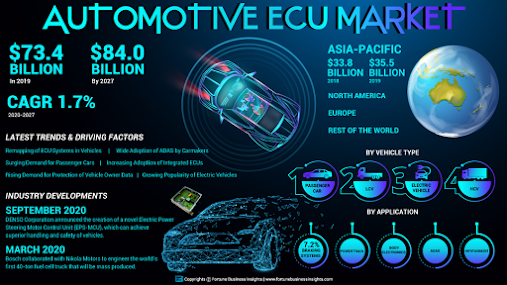The global automotive
electronic control unit market size is projected to reach USD 84.0 billion
by 2027, exhibiting a CAGR of 1.7% during the forecast period. Growing adoption
of integrated ECUs by car-buyers will lead to sustained progress of this
market, highlights Fortune Business Insights™ in its report, titled “Automotive
Electronic Control Unit (ECU) Market Size, Share & COVID-19 Impact Analysis,
By Vehicle Type (Passenger Car, Light Commercial Vehicle, Heavy Commercial
Vehicle and Electric Vehicle), By Application (Powertrain, Braking System, Body
Electronics, ADAS, Infotainment) and Regional Forecast, 2020-2027”.
Electronic control units are designed to automate the core functions of
vehicles, which not only elevate their efficiency but also make them safer and
smarter. Integrated or single-system ECUs have emerged as an alternative to the
multiple ECU systems, offering considerable advantages over the latter. For
example, a multiple ECU system is expensive as it consists of different parts,
while an integrated ECU is naturally less costly as it’s a unified system,
which is also easier to design. Similarly, carmakers need to invest fewer hours
and monies in testing single ECU systems as there is only one unit that needs
to be tested; for multiple ECU systems, more time and money are required for
testing, thereby inflating development costs. Thus, the cost-effectiveness and
operational efficiency of integrated ECUs are fueling their adoption and boosting
the growth of this market.
List of Key Companies Profiled in the Automotive Electronic Control
Unit Market Report:
- NXP
Semiconductors N.V. (Eindhoven, Netherlands)
- Valeo Inc.
(Paris, France)
- Robert Bosch
GmbH (Stuttgart, Germany)
- Hyundai
Mobis (Seoul, Korea)
- Continental
AG (Hanover, Germany)
- Delphi
Technologies (London, U.K)
- Altera
(Intel Corporation) (California, United States)
- Autoliv
(Stockholm, Sweden)
- DENSO
Corporation (Kariya, Aichi, Japan)
- ZF
FRIEDRICHSHAFEN AG (Friedrichshafen,
Germany)
As per the
ECU market report, the value of the market stood at USD 73.4 billion in 2019.
The main features of the report include:
· Comprehensive
study of the factors driving and restraining market growth;
· Detailed
analysis of the market segments and opportunities;
· Tangible
insights into the regional dynamics shaping the market; and
· Microscopic
examination of the leading players and their key strategies.
Market Restraint
Steep Decline in Sales & Closure of Plants amid COVID-19 to
Stall Growth
The economic fallout in the
automotive industry precipitated by the COVID-19 pandemic is likely to hit the
automotive electronic control unit market growth. For example, according to the
Oxford Business Group (OBG), in March 2020 the demand for light vehicles in the
European Union shrunk by 44%, while in the ASEAN it contracted by 40%. In the
US, passenger vehicle sales reduced by 46% in April 2020, the OBG reported in
June. Declining sales, lockdowns, and social distancing also forced several
automakers to close their manufacturing plants, a trend that was highly
noticeable in Europe. Fiat Chrysler, for instance, closed several plants across
Italy, Poland, and Serbia in March 2020. Volkswagen and France-based PSA Group
had to take similar measures. Such drastic turn of events is inhibiting the
adoption of ECUs and stalling the growth of this market in the process.
Read Detailed Summary of This Research Report:
Regional Insights
Increasing Purchasing Power in Asia Pacific to Favor Regional
Market Growth
Asia Pacific dominated the
automotive electronic control unit market share in 2019, boasting a market size
of USD 35.5 billion. The region is expected to retain its apex position during
the forecast owing to the rising willingness among consumers in the region to
purchase high-end cars, which is a direct result of the increasing disposable
income.
In North America, the top growth
driver for the market will be the increasing preference for advanced automotive
ECUs for enhanced safety of occupants. On the other hand, the market in Europe
is anticipated to showcase an impressive growth trajectory on account of the
strong presence of some of the world’s biggest automakers, such as Volkswagen
and BMW, in the region.
Competitive Landscape
Investments in Cutting-Edge Technologies to Give Key Players
Strategic Edge
Key players in the automotive ECU
market are steadily expanding their investments in next-gen, cutting-edge
vehicular electronics to gain a competitive edge over other participants.
Besides this, companies are also partnering with other competitors to broaden
their innovation horizons.
Industry Developments:
· September 2020: DENSO
Corporation announced the creation of a novel Electric Power Steering Motor
Control Unit (EPS-MCU), which can achieve superior handling and safety of
vehicles. It made its debut in the Toyota Harrier that was launched in June
2020.
· March 2020: Bosch collaborated with Nikola Motors to engineer the world’s first 40-ton fuel cell truck that will be mass produced. A key component of the Nikola Two trucks is the Vehicle Control Unit developed by Bosch to manage the complex electric & electronic power that these trucks need.
Read Press Release:

No comments:
Post a Comment